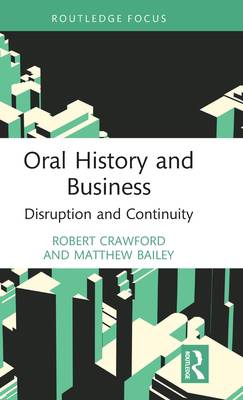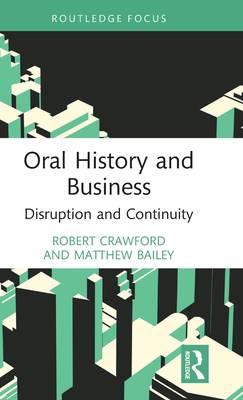
- Afhalen na 1 uur in een winkel met voorraad
- Gratis thuislevering in België vanaf € 30
- Ruim aanbod met 7 miljoen producten
- Afhalen na 1 uur in een winkel met voorraad
- Gratis thuislevering in België vanaf € 30
- Ruim aanbod met 7 miljoen producten
Oral History and Business
Disruption and Continuity
Robert Crawford, Matthew BaileyOmschrijving
This book introduces business historians to oral history methodologies and approaches.
Using four distinct oral history case studies to explore ideas of disruption and continuity in business history over the second half of the twentieth century, Robert Crawford and Matthew Bailey demonstrate how critical engagement with oral history approaches serves to enhance and enliven business history as well as its relationship with other historical fields. The focus on disruption is used to encompass a broad set of processes such as technological change, the impact of external forces, informal business networks, social constructions of gender, knowledge transfer, firm adaptability and cultural change. The use of oral histories to interpret responses to disruption in the past, and to explore the features characterising business continuity, provides an opportunity to consider the human dimensions, subjective experiences and personal insights of workplace, firm and industry change. It also sheds light on the ways that people and firms respond to disruptive forces through innovation and adaptation - both successfully and unsuccessfully.
This succinct and accessible account is essential reading for business historians with little experience in using oral history, as well as those looking to gain deeper insights from their oral history data.
Specificaties
Betrokkenen
- Auteur(s):
- Uitgeverij:
Inhoud
- Aantal bladzijden:
- 122
- Taal:
- Engels
Eigenschappen
- Productcode (EAN):
- 9780367774066
- Verschijningsdatum:
- 22/08/2022
- Uitvoering:
- Hardcover
- Formaat:
- Genaaid
- Afmetingen:
- 140 mm x 216 mm
- Gewicht:
- 299 g

Alleen bij Standaard Boekhandel
Beoordelingen
We publiceren alleen reviews die voldoen aan de voorwaarden voor reviews. Bekijk onze voorwaarden voor reviews.











